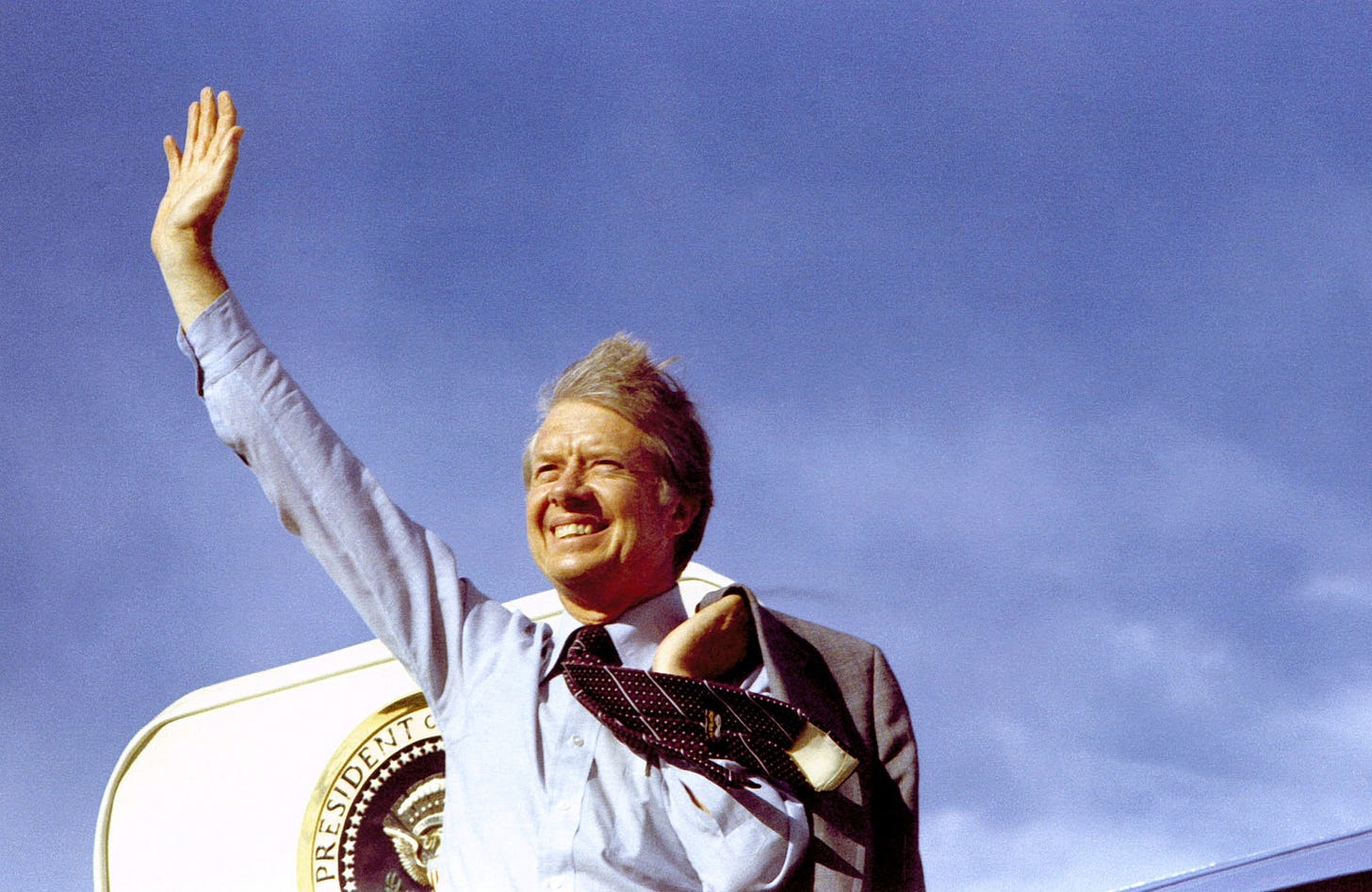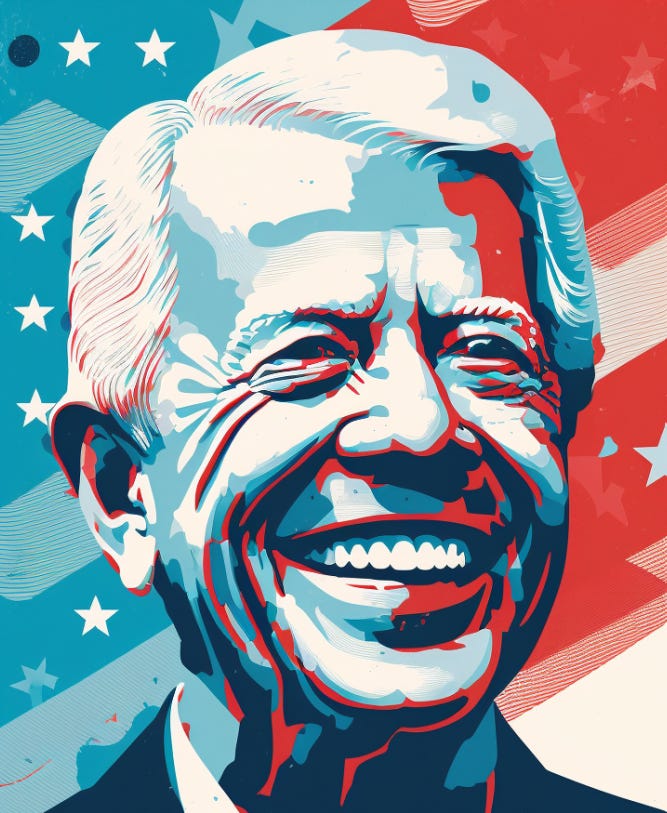Jimmy Carter leaves a monumental legacy
His presidency was more consequential than most people realize
Update: President Carter died on December 29, 2024. He was 100 years old.
I am back from taking a week off. This week, we’re looking at President Jimmy Carter's extraordinary presidency. President Carter, 98, is in hospice care. If you’d like to leave a message of peace and comfort for the Carter family, you can do so here.
‘He’s a better ex-president than he was a president.’
It’s a common, if not nearly universal, assessment of the Carter presidency. But is the conventional wisdom borne out by the facts? By modern standards, the Carter presidency was incredibly consequential.
James Earl Carter, Jr. narrowly defeated President Gerald Ford in the 1976 general election (conventional wisdom holds that Ford’s pardoning of Richard Nixon probably sunk his re-election). Following his inauguration in January 1977, Carter immediately began implementing an energetic domestic policy. On his second day in office, he pardoned everyone who fled abroad to avoid the draft during the Vietnam War. This was a morally courageous yet politically risky move that enabled the country to begin to put the war in the rearview mirror.
Then Carter turned his attention to the half-decade-old energy crisis. Even though the oil embargo was lifted in 1974, prices remained stubbornly high and the country was mired in a recession. Carter tackled the crisis by rolling out a bold national energy policy that stressed conservation, price controls, and investments in renewable energy. Symbolically, Carter installed solar panels on the roof of the White House (Reagan later symbolically uninstalled them) and wore sweaters indoors to conserve heat. To underscore the importance of energy policy, the Department of Energy was created in 1977 - the first new government department in 11 years. The 1978 energy bill went further and deregulated the natural gas industry and introduced tax credits for conservation and renewables.
In 1978, Carter also signed the Airline Deregulation Act abolishing the Civil Aeronautics Board and allowing market forces to set airfares and determine routes. This gave birth to the modern commercial aviation system and opened up air travel to hundreds of millions of middle-class Americans. Prior to deregulation, air travel was largely the exclusive domain of the wealthy with high fares and little competition, and many second and third-tier cities had no air service at all.
In 1979, the Carter administration signed organizing legislation creating the Department of Education, fulfilling a campaign promise to elevate education as a federal priority. Under Carter, Head Start expanded rapidly and the percentage of non-defense dollars spent on education doubled.
To the delight of beer enthusiasts everywhere, in 1979 Carter also deregulated the beer industry, which made it legal to sell hops, yeast, and malt to home and craft brewers. This effectively ended the last restrictions imposed during Prohibition and ignited a craft beer boom. Today, there are more than 9,000 microbreweries in the U.S. If you’re reading this while enjoying your favorite craft beer, thank Jimmy Carter.
In foreign policy, the Carter administration was equally active.
In September 1977, the Corrijos-Carter Treaty was signed, which committed the U.S. to return the Panama Canal to Panama no later than 1999.
Almost exactly a year later, Carter brokered talks between Egyptian president Anwar Sadat and Israeli Prime Minister Menachem Begin at Camp David. Those talks led to the Camp David Accords, which ended the state of war between Egypt and Israel. A peace treaty with Jordan soon followed.
In 1979, Carter normalized relations with the People’s Republic of China, enabling what is now a flourishing economic relationship between the world’s two largest economies. That same year, the U.S. and the Soviet Union signed the SALT II treaty, further limiting nuclear arsenals and implementing a comprehensive nuclear test ban.
Time was, however, not Jimmy Carter’s friend.
The 1979 oil shock, caused by the revolution in Iran, crushed a nascent economic recovery. That same year, the Soviet Union invaded Afghanistan, leading the U.S. to embargo grain exports to that country (a key export market) and boycott the 1980 Summer Olympics in Moscow. In Iran, protesters occupied the U.S. Embassy, precipitating a hostage crisis. By 1980, the revolution in Iran, coupled with OPEC’s doubling of oil prices, resulted in inflation that reached almost 14%.
Campaigning during a deep recession and double-digit inflation, Carter was defeated in a landslide in the 1980 general election. Ronald Reagan won 489 electoral votes and 44 states, and the Republicans picked up the Senate for the first time since 1952. These crises, and his crushing defeat, came to define how the Carter presidency is viewed.
Out of office, Carter flourished. In 1982, he founded The Carter Center, which has observed elections in more than 100 countries and whose health programs have all but eliminated Guinea Worm. In addition to his tireless support for Habitat for Humanity, Carter won the Nobel Peace Prize for his work in 2002. He’s written 34 books and won three Grammy Awards for Best Spoken Word Album.
Today, his legacy remains in draft form. On March 18, 2023, the New York Times published a deeply-sourced story revealing that, in the run-up to the 1980 election, the Reagan campaign dispatched operatives to Arab-world capitals to deliver a message: tell Iran that they will get a better deal from the U.S. if they don’t release the hostages until after the election.
There would be no October surprise to help Carter.
Minutes after President Reagan completed his inaugural address on January 20, 1981, the remaining 52 American hostages were released.






